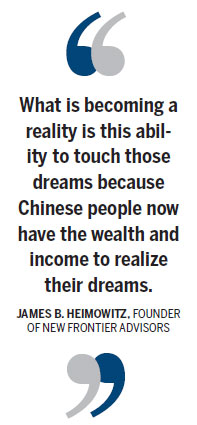Consumers now have high expectations
Updated: 2014-05-16 07:48
By Andrew Moody (China Daily Europe)
|
|||||||||||
|
James B. Heimowitz, founder of New Frontier Advisors. Wang Zhuangfei / For China Daily |
Meeting challenge of Chinese Dream is going to be difficult for both Chinese and Western companies
James B. Heimowitz says the challenge for international brands in China will be to live up to the increasing demands of consumers, whether or not they are inspired by the Chinese Dream.
The former China chairman and CEO for Asia of public relations giant Hill and Knowlton, who handled the Beijing Olympics international media account, insists the Chinese market is no longer a pushover.
"The reality is that goods and services in China are going to have to live up to some pretty high expectations. The challenge is going to be how to deliver world-class products that are tailored to that desire," he says.
The 52-year-old was speaking in a restaurant Galleria Shopping Center, one of Beijing's shiny new temples to consumerism.
Even though it was a national holiday, hundreds of shoppers were window shopping or making purchases at the center's mainly upscale stores.
"I am not sure if the Chinese Dream is any different from any other human desires. I think those personal dreams are universal. What is becoming a reality is this ability to touch those dreams because Chinese people now have the wealth and income to realize their dreams," he says.
Heimowitz, who has recently launched New Frontier Advisors, a new consultancy based next to the shopping center which will advise on all aspects of business and not just public relations, believes China does have a chance with the Chinese Dream concept to find a new form of self-expression.
"I think in a sense it is a pride as to where China has come from and where it wants to go. It is 5,000 years old and has a lot of history to draw upon to do this in a much more meaningful way than the American Dream. That is just 200 years old and is based to some extent on the rags to riches stories of the 19th century writer Horatio Alger."

Heimowitz says the challenge in China is not now just for international brands but for Chinese ones too.
"Western brands were originally so successful because they could deliver a level of assuredness of guaranteed quality. They are not having as easier time of it now than they had 10 years ago. Chinese companies are increasingly delivering quality products, although they have perhaps yet to convert this to much brand value on top of this."
Heimowitz, who speaks fluent Mandarin (as well as Cantonese, French and some Japanese, Thai and Malay) and who was brought up in New York, first came to China in 1979 to study at Beijing Normal University as part of his University of Pennsylvania degree in Oriental studies.
"When I first came off the plane it was like landing on Mars. What I have learned is that from decade after decade of being here is that China has begun to act and smell like the rest of the world. Living in Beijing now is like living in any other capital city around the region."
After doing an MBA in finance at Wharton he returned to China with David Rockefeller, chairman and chief executive of Chase Manhattan Bank, to help the bank set up branch offices. During this time he was photographed with Deng Xiaoping who met with Rockefeller in Shenzhen.
"He was explaining the significance of special economic zones and their importance to the future of China's economic development at the time. I still have the photograph," he says.
Heimowitz went on to be managing director of corporate strategy for Deutsche Bank and then manager of Boston Consulting Group's Asia team. After that he set up his own consultancy, JBH Consulting, which he sold to advertising giant WPP in 2004.
The deal led to him becoming CEO for Asia of WPP's subsidiary Hill and Knowlton where he managed 500 staff over 13 offices and then to handling the Beijing Olympics account.
"China's senior leadership was determined to show that China was becoming part of the global community and they wanted to engage an international communications agency to help them.
"It was a turning point for China since the international media had never descended on the country in quite such a way before. I was very proud of the work we did and I think the world had a different insight of China post-Olympics than before."
Heimowitz says it will be perhaps more of a challenge for the concept of the Chinese Dream to have as much resonance as staging an international event as the Olympics but he does not deny its potential importance.
"I don't think Western companies are likely to respond to a policy speech by Chinese President Xi Jinping in quite the same way. His dream is all encompassing, however. It covers a range of different aspects and I do believe that across the generations - young, middle-aged and older members of society - see this national vision as part of an overall dream."
He does believe, however, that meeting the challenge of the Chinese Dream is going to be a difficult for both Chinese and Western companies.
"I think acknowledging a national aspiration and a dream is a very positive thing but on its own it is not enough. You have to have the quality and service to back it up. The next generation of companies have got to figure out how they connect with it and how by doing so they resonate with the purchasing power of consumers."
Heimowitz says whatever the aspirations of companies are in China, many of the business challenges will remain the same.
"Companies make mistakes coming to China all the time. What I find with Western companies is that they spend a lot of time getting their strategy right and I think about 80 percent of the time they succeed but then they fail on the implementation.
"With Chinese companies it is the reverse. They actually get the implementation right which actually often makes up for failings in their strategy."
Heimowitz believes Chinese companies will need more than implementation prowess to establish their brands globally, which is part of the Chinese Dream of projecting national power.
"Chinese companies going overseas have stumbled, much the same way as Western companies have in China over the years. But each time they have stumbled they have learned something and they get better and better."
He says one way for Chinese companies to go global is by mergers and acquisitions and one of the early pioneers was Lenovo buying IBM's personal computer business in 2005. Heimowitz at Hill and Knowlton was a public relations adviser for Lenovo.
"I come from a mergers and acquisitions background and I think it is in this area that some aspects of the dream can be fulfilled. What you have to do is remove the fear that might exist in, say, Europe about being taken over by a Chinese company," he says.
"This will diminish over time as more and more deals are done and China becomes more familiar with Western business practices and customers. Where you want to arrive at though is a position where having a Chinese boss is no different from having any other kind of boss."
Heimowitz believes that for China to achieve the dream it needs to improve its soft power.
"I feel that America has been the past master of exercising soft power on a global arena but to some extent its prowess is receding and that has opened up a vacuum.
"If China is going to step into that space it needs to learn how to nuance soft power and promote itself in a softer light. If it can do it will be an important step on the way to realizing its dream."
andrewmoody@chinadaily.com.cn
(China Daily European Weekly 05/16/2014 page10)
Today's Top News
Egypt angered about China's fake Sphinx
Poroshenko wins Ukraine election - exit poll
Euro elections reflect EU consensus
Pope calls for Israel-Palestine peace
Click profit online in China
Ukraine's presidential polls backfire
EU-wide elections could shake up the bloc
Beijing urges to intensify terror fight
Hot Topics
Lunar probe , China growth forecasts, Emission rules get tougher, China seen through 'colored lens', International board,
Editor's Picks

|

|

|

|

|

|






